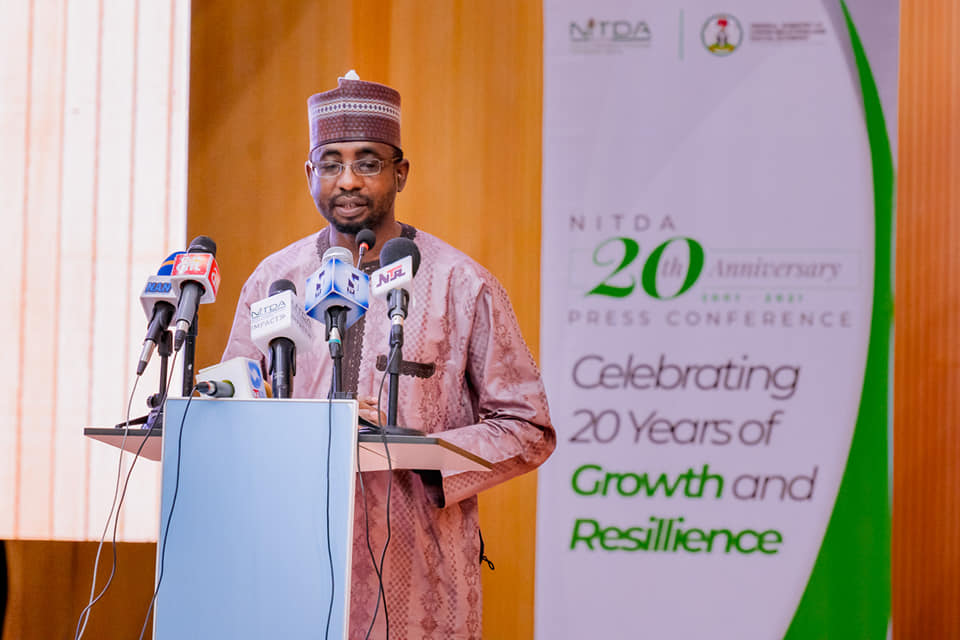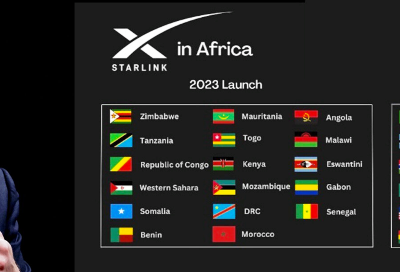Here are the highlights of where NITDA is focusing on in the next four years. The new SRAP appears to stress that building Nigeria as an economic giant via ICT begins today. By Olubayo Abiodun.
Nigeria is a massive cluster of bright minds and very intelligent innovators, IT & ICT gurus and masterminds in the telecoms ecosystems. Regardless, the activities in this converged ecosystem seem to be taking place in a slow motion. Nonetheless, majority still struggle to glean their daily meals from these uncharted paths. The unstructured coordination left most of the potentials largely untapped and leading to lost opportunities and massive resource leakages. And those superintending the informal space continue to have their canapés and espressos. And there lies the real and present danger to the nation’s economic rebirth.
If Nigeria does not amplify its drive towards attaining global economic prominence, using IT and ICT as the catalyst of growth and development, it would have missed the golden opportunity to emphatically affirm the axiom that the journey of a thousand miles begins with the first step. Since it is often stressed by popular truism that Rome was not built in a day, Nigeria’s quest to become a key factor in the digital economies of the 21st Century, it is imperative that the nation’s strategic leaders and stakeholders must take the Bull by the horns to make a giant leap out of the current economic dire straits.
Oil is drying up and the nation is more than ever confronted with the realities of the expiring quantum of oil wells in Nigeria. This reality has further given sordid fillip to the decreasing relevance of oil in the global energy mix and the concomitant drastic drops in oil revenues which remains a significant portion of the revenues basket in Nigeria’s economy. The resultant shaky impacts on the stability of the nation’s economy has forced the hand of government and other stakeholders in the private sector to demand for the refocusing of the mono-economy to the complete diversification in order to create a robust capacity to meet the buoyant global realities.
In the last one year and there about, the magnificent impact of start-ups and the global tractions that brands like Kobo360, Paystack and Flutterwave gave Nigeria has been huge. What the IT, ICT and Telecoms as well as the relatively young technology innovators are giving to the nations GDP is enormous. This is obviously the new Nigeria that the NITDA roadmap is targeting, all other things being equal. And if all goes well as projected and the NITDA roadmap receives the overwhelming acceptance by the state and non-state actors, then unlocking the new Nigeria may no longer be far-fetched.
Today, the sing-song in the country, particularly from the temple of stakeholders, is the strident calls for the diversification of Nigeria’s economy. The upsurge in the contributions of IT, ICT and Telecoms to the resource portfolio of the nation’s revenue stream has increasingly validated the push to reduce the over dependence on Oil and Gas in the largely mono-based economy. NITDA’s mandate is pivotal to the realisation of the digitization and digitalization programmes of the Nigerian federation. And the key points in the economic transformation trajectories include the volume of the Foreign Direct Investments (FDIs) and the capacity of the public and private institutions to ensure openness, transparency, and efficiency in the government processes.
TAKE AWAYS OF THE ROADMAP
If the roadmap as prudently outlined and projected is efficiently and effectively followed through by the strategic state and non-state actors, it is no gain saying that the benefits are humongous to the transformation of the nation in the line of digital economy. And that would be in direct compliance with the 21st Century economic outlook. By providing the legal framework for information technology development, pioneering IT developmental projects, facilitating access to information technology goods and services, catalysing job creation and ensuring national security, NITDA’a roadmap will assist Nigeria to gain enormous strength to be classified as a nation on the digital plane.
In today’s world, the lifestyle of the entire human race is being disrupted daily by the evolving new technologies. The way humans socialise, do business, play as political animals and government to government activities have been significantly disrupted by the new technologies evolving at the speed of light. To avoid regrets of monumental proportion, Nigeria must immediately join the fray to avoid catastrophic socio-economic, political and technological setback that may consign it as a beggarly entity in the comity of nations.
IS THE ROADMAP ENOUGH BY ITSELF AS A DCOUMENT?
Given the decrepit state of the nation’s infrastructure, low capital budget commitment to IT infrastructure, inadequacy of capacity building in ICTs skills, how far can the NITDA roadmap really accomplish the designated agenda for the digitization and the transformation of the nation to a digital economy?
What about the inconsistency in policy environment, are we building strong institutions or the nation’s MDAs is enmeshed in the politics of regime change and partisan politics where the baby and the bathe water are thrown away once there is a change in the political party that controls the centre from the previous administration. Are the political leaders and senior government career administrators aligned in their thoughts on the policy direction in the roadmap? Do political appointees take time to understand the direction of the roadmap met on the ground or for whatever interest a rolling plan is jettisoned as soon as a new appointee gets on the saddle?
Discipline is fundamental to the success of the beautiful plans drawn up in the NITDA roadmap. But be it as it may, discipline, transparency, openness in the presentation and management of data alone may not unlock a growth miracle, yet if they help, nations avoid costly setbacks and it won’t be insignificant. However, not being able to coordinate a framework for the transformation of country’s economy into the future of the 21st Century digital outlook is eerie. This is where this effort of NITDA is commendable and must be applauded. However, like other agencies in its ilk, Nigeria is not in short supplies of brilliantly and intelligently framed policy instruments, the challenges more often than not is not with the framers of the document but the shortage of political will and absence of the right leadership to interpret the content of the policy document for the public good.
It is the same reason Nigeria did not feature prominently in the global industrial revolution up to the 3rd industrial outlook. The 4th industrial revolution is a leveller if the nation can seize the moment by deploying its IT and ICT capabilities to energise its digital economy. Nigerian youths playing in the start-ups space have demonstrated enormous potentials to position the country in pole’s position for a good slice of the $11.5 trillion global digital economy. However, this may not be a cheap cake to slice if the derelict infrastructure and open sleaze at the front offices of the nation’s global interface continues unabated. Foreign investors have very low tolerance for corruption and inefficient processes. This ‘disease’ more often than not is man-made. Take for instance, the compromising attitude of compatriots manning the consular needs of foreign investors. In the same vein, the attitude of Immigration Officers managing the passport document of travellers leaves much to be desired. Despite the introduction of online processes to limit human interface, the systemic rots has been deliberated integrated to make human interface perpetually unavoidable. Ditto for the processes for the renewal of Nigeria’s driver license.
NITDA has been strategically positioned to create awareness in the public sector, facilitate digital literacy, and develop standard guidelines as well as framework for government agencies to ensure proper handshakes. The intra and inter agency links in the public and private sectors is essential for the seamless and healthy growth and developments in the nation’s economy. This is how the upsurge in the contributions of IT and ICT to the nation’s GDP which started with less than 0.5 per cent in 2001 to an all-time high of 14 per cent in 2020 can be sustained. To even improve on these current performances and also boost job creations and energize innovative activities in the tech ecosystem, this roadmap ought to be given all the requisite supports as the fulcrum of Nigeria’s digital economy transformation.
There is so much more to be achieved with the digital inclusion and literacy. This would eventually be impactful in the evolving new sectors such as Fintech, eCommerce, Venture Capital Investments (VCI), Business Process Outsourcing (BPO), Data Protection Compliance Organisation (DPCO), IT Equipment Manufacturing and Software Engineering which are gradually and steadily gaining tractions in the economic ecosystems across the country.
NITDA’s pioneer roadmap marshalled by its immediate past Director General and now Minister of Communications and Digital Economy, Dr Isa Ali Ibrahim Pantami, was from 2017 – 2020. This particular roadmap was anchored on seven pillars: IT Regulations, Local Content Development and Promotion, Cybersecurity, Government Digital Service Promotion, Digital Job Creation, Digital Inclusion, and Capacity Building.
Various achievements have been recorded in these areas though it cannot be said that any of these pillars has achieved Eldorado. With the progress made in this previous roadmap, it is imperative that pushing the frontiers of the 186 page NITDA Strategic Roadmap And Action Plan (SRAP 2021 – 2024) would naturally consolidate the building blocks already laid for the integration of Nigeria into the digital economic space. Like its precursor, the new document is hinged on seven pillars: Digital Innovation & Entrepreneurship, Promotion of Indigenous Content, Digital Transformation, Digital Literacy and Skills, Emerging Technology, Cybersecurity and Developmental Regulations. Each of these pillars have strategic initiatives based on identified objectives. And these different initiatives are further delineated into activities which are also further structured into implementation plans.
The long and short of SRAP objectives is about using technology to increase productivity, efficiency and effectiveness of government machinery, reduction in revenue leakages and wastages, cutting off the channels of sleaze and corruption by limiting human intefaces which makes people vulnerable to abuse of processes.
THE CHALLENGES
The greatest structural drawbacks for the successes of this policy thrust would be the challenging power inadequacy in the country. Electricity is crucial, particularly sustainable clean power is essential for the operations and lifespan of the highly capital intensive IT infrastructure being deployed for the digital economy.
Also, the understanding and acceptance of the concept of digital economy by the political office holders and administrators of government machineries is pivotal to the overall successes of SRAP. That is one crucial way of stemming the culture of policy summersault and routine abuse of policy outlines. The culture of impunity in the procurement processes and deliberate abuse and sabotage of the technical architecture must be equally addressed.
Again poor capital ratio for technology acquisition and adoption must be significantly addressed to sustain the current tempo in the journey towards the digital economy transformation. In addition, the poor maintenance culture must be replaced with the culture of consistencies in maintenance of the equipment and infrastructure. More importantly, a proper alignment and re-alignment of the IT and ICT Curricula is fundamental to achieving global standards and best practices. Inadequacy of training infrastructure and paucity of the training contents would naturally deliver poor skills development.
Creating Innovation Parks as Centres of Excellence in each States of the federation would go a long way in supporting the vision and mission of NITDA encapsulated in SRAP 2021 – 2024. .
































